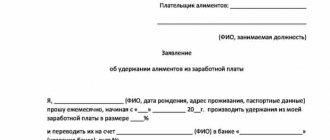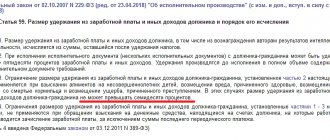The obligation of parents to financially support their children is unconditional. According to statistics, every fifth family in Russia faces the need to resolve the issue of paying alimony. This issue can be resolved without going to court, by voluntarily concluding a notarial alimony agreement.
The document is an agreement drawn up by mutual consent of the participants in the alimony relationship. It defines the conditions, method, period, frequency of payment of funds. A notarial agreement on the payment of alimony has the same legal force as a writ of execution. Without the signature and seal of a notary, a document is legally void.
Parties appearing in the document
An important nuance. Often, alimony is closely associated with divorce proceedings. Indeed, in most cases they are appointed specifically upon divorce. However, it is not at all necessary by law that the parents have ever been legally married. Therefore, a child support agreement can be concluded even if the parents never legalized their relationship, but gave birth to a common child, and now have decided to separate.
The economic essence of alimony is that a parent (or parents) pays certain amounts in favor of the other parent (or other persons) who maintain minor children or other persons who are legally entitled to alimony. Accordingly, the parties to the agreement may be the following:
- A person legally obligated to pay child support.
- The person who is entitled to these payments. In particular, if payments are due to a child aged 14 to 18 years, he already becomes a party to the agreement.
- Persons who are the actual guardians of young children.
Payment method and procedure
The following payment methods are allowed:
- Establishing a fixed share of income. Let us remind you that the law establishes a minimum share of 25% for one child, 33% for two and 50% if there are more than two children. Therefore, the share in the agreement may be the same or more.
- Establishing a fixed payment amount. Both periodic and one-time payments of a fixed amount are possible.
- Transferring ownership of certain property or undertaking obligations to acquire certain property. Most often we are talking about real estate objects.
- Combined methods.
At the same time, the text of the document also specifies the method of transferring payments. This can be either a direct transfer of assets or various types of transfers: bank, postal. It is possible to order payments to the organization where the alimony payer works.
Consequence of non-payment - risk insurance
There may be a situation in which the validity of the contract may be jeopardized. The reason is the financial insolvency of the debtor.
The alimony agreement must include the following items:
- There is nothing wrong with including penalties for late payments. The recommended rate is 0.1% of the amount of payments per day. The contract may provide for the transfer of debt into an asset of movable or immovable property;
- All payments must be made via bank transfers. It’s convenient for everyone – the recipient of funds and the sender. The sender does not need to prove the fulfillment of the contract in the event of possible litigation;
- flexibility of conditions. If the debtor has difficulty in fulfilling, give the opportunity to replace payments with delivery of products. Invoices from stores will be included in the total cost of material support.
Required documents
For registration you will need the following package of documents:
- Passports of adult parties. It can be either a Russian passport or a foreign passport with a notarized translation into Russian.
- Child's birth certificate.
- Other documents confirming the right to receive alimony (medical certificates, etc.)
The notary explains to the parties the legal consequences of signing documents, checks all the facts, makes sure that this action is voluntary, and certifies the document.
How to draw up an agreement correctly
In accordance with Russian legislation, an agreement on the payment of alimony must be drawn up in writing and certified by a notary. When concluding such an agreement, both parties must be present - both the payer and the recipient of alimony. If the child for whose maintenance alimony will be paid is between 14 and 18 years old, his presence is also required when signing the agreement.
There is no special strict form of the agreement, but it is necessary to indicate the following information:
- details of the payer and recipient of alimony - full name, address, contact information;
- details of the child for whose maintenance alimony will be paid;
- terms - the beginning and end of the payment of alimony;
- method of payment - will it be a fixed amount or a certain share of the payer’s income;
- frequency of payments—once a month, every quarter, every six months, etc.;
- how will alimony be indexed;
- the amount of penalties in case of late payments;
- additional conditions that are included in the agreement by mutual agreement of both parties to the agreement.
Change, termination, indexing of a document
Article 101 of the RF IC provides:
- the right of the parties to change the terms of the alimony agreement by applying to a notary or to the court, mutually or unilaterally;
- the opportunity to terminate the document in the same way: if there is mutual desire - at a notary, if there are disagreements - in court.
To protect funds from inflation, the document can provide for an indexation procedure, i.e., a mechanism for increasing the amount of payments depending on the increase in consumer prices. If this issue is not resolved by the parties independently, indexation is made at the place where alimony is withheld in proportion to the minimum wage.
It is more convenient to draw up a notarized agreement on the payment of alimony seven days a week by appointment.
How to officially certify the agreement?
In order for the agreement to have legal force, it must be certified by a notary. To do this, you must provide a number of documents to the notary office:
- a ready-made agreement on the payment of alimony or a draft agreement (if any);
- passports of both parties;
- documents confirming the relationship of the parties;
- certificates of income of one of the parties - the alimony payer.
If you do not have a ready-made version of the agreement, a notary can draw it up. This is an additional service that must be paid separately - in addition to the notary fee for the agreement.
Once the notary receives all the papers, he will conduct a thorough check of the documents and the agreement for compliance with legal requirements. If the agreement does not contradict the law, the notary will certify it with his signature and seal, after which the document will enter into legal force.
If changes are made to the agreement in the future, a new agreement will have to be concluded and certified by a notary office.
When is an agreement drawn up?
You can divide property and have a written agreement (sample) certified by a notary at any time: while in an active marriage, after a divorce at the request of one of the former marriage partners. In the latter case, you need to remember the statute of limitations. It is 3 years from the moment when the spouse demanding division learned about the violation of his rights, and not from the date of divorce in the registry office or by court decision (clause 1 of Article 200 of the Civil Code of the Russian Federation).
In addition, an agreement on the division of property between spouses with a notary is often drawn up in a situation where creditors file an application with the court for forced collection of debts against one of them. This is a more practical solution, since when the issue is considered in court, family property is most often divided in half. Through a notarial agreement, it can be distributed at your own discretion (Article 38 of the RF IC).
How much does it cost to have an alimony payment agreement certified in Moscow?
The cost of a notary's service to certify an agreement is determined by the standard notarial tariff and is 250 rubles. The size of the notary fee is regulated by the “Fundamentals of the legislation of the Russian Federation on notaries”.
If you need additional services (consultation, drawing up an agreement, legal support of the transaction), their price will be 7,000 rubles.
To certify the agreement to pay alimony, make an appointment at the notary’s office using the “online registration” form. Choose a convenient time and come - our specialists can not only certify your agreement, but also competently develop its content and advise on all legal issues related to alimony payments.
Agreement on alimony with a notary: content, price
A settlement agreement is a legally binding document in which the parties to the transaction agree on all financial and educational issues regarding joint children. The main advantages of concluding a settlement between former spouses are:
- The speed and simplicity of resolving the issue is enough to discuss all the nuances once, and then state the general solution in writing. Immediately after the signatures of the parties to the agreement and notarization, the document comes into legal force.
- Maximum consideration of the interests of children - unlike a court decision that focuses on the financial side of the issue, a peaceful settlement guarantees comprehensive coverage of the problem. Former spouses can indicate in the agreement any items related to the child: who picks him up after training, who to spend spring or fall holidays with, who pays for additional or creative training, etc.
- Alternative options for financial support - one of the parents can transfer expensive property (apartment, car, antiques, etc.) to the child, the cost of which covers all future child support payments.
Important! Any marital agreement regarding children must be in writing. Oral commitments cannot be confirmed and proven in court.
Content
Attention! The articles describe typical ways to resolve legal issues, but each case is unique. If you want to find out how to solve your particular problem - and get a free consultation:
The main points of the peace agreement are:
- personal data of the participants in the transaction - the full names of both parents, passport details, registration addresses are indicated;
- information about children - the full name and date of birth of each child is written down (if there are several children);
- date of first payment;
- methods and procedure for payment - it is acceptable to use cash or non-cash payments with the obligatory recording of each tranche in the appropriate way (mail, check, receipt, etc.);
- size of payments - it is possible to determine a fixed monthly amount for the maintenance and other needs of the child or a percentage of the total earnings of the father or mother;
- non-financial obligations - it is necessary to register all the most insignificant nuances, so as not to subsequently be limited in rights;
- responsibility for failure to fulfill obligations - most often, former spouses agree to terminate the agreement if one of the parties cannot or does not want to fulfill its obligations;
- the validity period of the document and the procedure for its extension.
Advice! The content of the alimony agreement should not contradict Russian legislation. If there is only one child together, the amount of the monthly payment should not be lower than 25% of total earnings, if there are two – 33%, three or more – from 50%. Otherwise, the document is considered illegitimate.
The cost of a notarial agreement on the payment of alimony
Certification of any document by a notary gives it official status and legal force. In the case of a settlement agreement between former spouses, contacting a notary office is a prerequisite:
- The document receives the status of a writ of execution - if the funds are not received in full within the specified time, the injured party can turn to the bailiffs for forced collection.
- Possibility of going to court - an agreement not signed by a notary is not significant evidence and will not allow the plaintiff to collect unpaid amounts of alimony for previous periods.
The price for certifying an agreement to pay alimony with a notary is 250 rubles. But potential clients need to be prepared for additional expenses:
- consulting services – from 500 rubles;
- drafting and production of a document – from 1000 rubles;
- percentage of the transaction if, by agreement, expensive property is transferred in favor of a minor (0.5%, but not more than 20,000 rubles).
A settlement agreement between parents is the most humane and expedient way to resolve common educational and financial issues. And the cost of the notary’s service will not be burdensome if you print out the draft agreement yourself and agree on it before visiting the notary’s office.
Attention! Due to recent changes in legislation, the legal information in this article may be out of date! Our lawyer can advise you free of charge - write your question in the form below:









